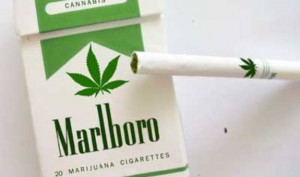Marlboro M hoax
Marlboro M Hoax refers to a widespread rumor that circulated primarily through social media and the internet, claiming that Marlboro, one of the world's leading cigarette brands owned by Philip Morris International, was planning to introduce a line of marijuana cigarettes. This rumor gained significant traction and was widely discussed and shared across various platforms, despite having no factual basis. The hoax typically suggested that Marlboro had intentions to venture into the legal marijuana market with a product named "Marlboro M."
Origin and Spread[edit | edit source]
The exact origin of the Marlboro M hoax is difficult to pinpoint, as is the case with many internet rumors. However, it is believed to have originated from a satirical article or an edited image that was taken at face value and shared without verification. The rumor spread rapidly, fueled by the growing legalization of marijuana in several U.S. states and other countries, which made the story seem plausible to many people.
Impact[edit | edit source]
The Marlboro M hoax had a notable impact in several ways. Firstly, it sparked widespread speculation and debate about the future of the tobacco industry and the potential for traditional cigarette companies to enter the marijuana market. It also led to an increase in scrutiny and discussion about the marketing practices of tobacco companies, particularly regarding the targeting of younger demographics.
Furthermore, the hoax prompted official responses from Philip Morris International, which had to publicly deny the rumors and clarify that the company had no plans to produce or sell marijuana cigarettes. This situation highlighted the challenges that companies face in managing misinformation and protecting their brand image in the digital age.
Analysis[edit | edit source]
The Marlboro M hoax serves as a case study in the power of internet rumors and the speed at which misinformation can spread. It underscores the importance of critical thinking and the need for individuals to verify information before sharing it. Additionally, the hoax reflects broader societal trends, including the changing attitudes towards marijuana use and the legalization movement, as well as the evolving landscape of the tobacco industry.
Conclusion[edit | edit source]
While the Marlboro M hoax was ultimately debunked, it remains a significant example of how quickly misinformation can circulate and the impact it can have on public perception and corporate reputation. It also illustrates the ongoing challenges that arise from the intersection of social media, public interest, and corporate communication.
![]() This Internet culture related article is a stub. You can help WikiMD by expanding it.
This Internet culture related article is a stub. You can help WikiMD by expanding it.
Navigation: Wellness - Encyclopedia - Health topics - Disease Index - Drugs - World Directory - Gray's Anatomy - Keto diet - Recipes
Search WikiMD
Ad.Tired of being Overweight? Try W8MD's physician weight loss program.
Semaglutide (Ozempic / Wegovy and Tirzepatide (Mounjaro / Zepbound) available.
Advertise on WikiMD
WikiMD is not a substitute for professional medical advice. See full disclaimer.
Credits:Most images are courtesy of Wikimedia commons, and templates Wikipedia, licensed under CC BY SA or similar.Contributors: Prab R. Tumpati, MD

